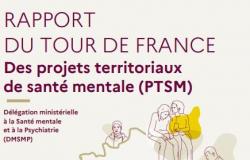LThe French Minister of the Interior, who meets his European counterparts in Luxembourg on Thursday, wants “require compensation” to « aides » granted to certain countries, so that they issue more consular passes, an essential document for returning a foreigner in an irregular situation to France.
Bruno Retailleau, who comes from the conservative right and takes a hard line on immigration, notably cited the renegotiation of trade agreements, which allow certain countries to benefit from tariff preferences.
These European agreements cannot be negotiated unilaterally by a member country, which is not the case for the sixty bilateral agreements signed by France with more than twenty countries to manage migratory flows.
The minister said he intended to review the Franco-Algerian agreement signed in 1968, which excludes Algerians from common law in matters of immigration. Since then, they have not had a residence permit in France but “residence certificates” valid for one to ten years.
Colonized by France for 132 years, Algeria proclaimed its independence on July 5, 1962 after a bloody war of liberation lasting almost eight years.
The minister insisted on Morocco and Algeria, explaining that he wanted to condition the issuance of visas for these countries on the resumption of their nationals arrested in an irregular situation. According to the minister, in 2023, Algeria obtained 205,853 visas and took back 2,191 of its nationals, while Morocco was granted 238,750 visas in exchange for 725 passes.
Morocco was divided into two protectorates in 1912, Spanish in its northern part, and French in the rest of the country before gaining independence in 1956.
“Using these international agreements to leverage has been around for a long time”more “we have noted an evolution since 2015 and the ‘migrant crisis’: we have moved from a system of incentives to negative counterparts”summarizes Sandra Lavenex, professor of international relations and European politics at the University of Geneva.
Resumption agreements for foreign nationals “ultra incentives do not work, but no study shows that with retaliatory measures, on the contrary, it will be more effective”notes Hélène Thiollet, researcher at Parisian Sciences Po University, specialist in migration policies in countries of the South.
On the ground, the return of illegal aliens proves all the more difficult as “people sometimes delete their identity papers; if we cannot prove with certainty that they really come from that country, it is difficult to impose their readmission, even with a trade agreement”adds Ms. Lavenex.
“Accepting the return of a person against their will, while they contribute during their migration to help their family back home, is not a popular measure for a government, especially if it concerns a large number of people”note Mme Lavenex.
The difficulty for Europe is also to find a “currency of exchange” : “it worked with Eastern European countries seeking to join the EU”but this comes up against others who are not candidates, she observes.
“For several years, States have essentially linked trade agreements to migration control objectives, but they have multiple objectives”recalls Ms. Thiollet. For example, they are used to “establish contracts with countries rich in raw materials (gas, oil, minerals, etc.), but also have security aims”. They make it possible to maintain a presence in countries where there are terrorist activities which can constitute a threat.
But Europe is no longer the “privileged partner” economic – as it may have been in the past – of these countries on which it wants to put pressure, also notes the researcher.
On the security side, certain African countries (Burkina Faso, Niger and Mali, Editor’s note) have already turned their backs on France and expressed positions « ultra hostiles » towards him, notes Ms. Thiollet. “They did not hesitate to turn to China and Russia.”
More generally, the researcher warns against using immigration as an object of negotiation: “the more this question is raised as an issue by a country, the more power it gives to non-European countries to weigh in the negotiations”warns Ms. Thiollet.





